
Plum Pie is a collection of nine short stories by P. G. Wodehouse, first published in the United Kingdom on 22 September 1966 by Barrie & Jenkins, and in the United States on 1 December 1967 by Simon & Schuster, Inc., New York. The collection's title is derived from P. G. Wodehouse's nickname, Plum.
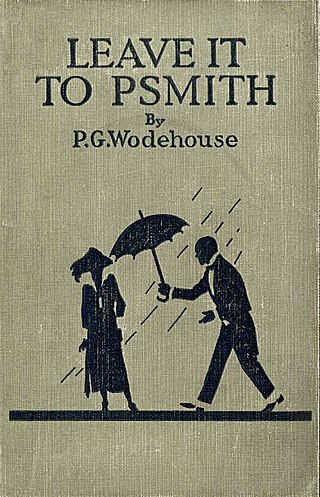
Leave It to Psmith is a comic novel by English author P. G. Wodehouse, first published in the United Kingdom on 30 November 1923 by Herbert Jenkins, London, England, and in the United States on 14 March 1924 by George H. Doran, New York. It had previously been serialised, in the Saturday Evening Post in the US between 3 February and 24 March 1923, and in the Grand Magazine in the UK between April and December that year; the ending of this magazine version was rewritten for the book form.

A Gentleman of Leisure is a novel by P. G. Wodehouse. The basic plot first appeared in a novella, The Gem Collector, in the December 1909 issue of Ainslee's Magazine.
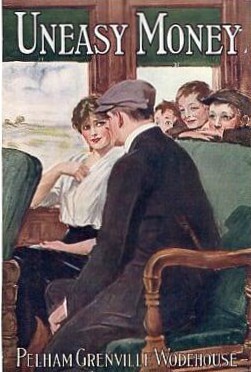
Uneasy Money is a novel by P. G. Wodehouse, first published in the United States on 17 March 1916 by D. Appleton & Company, New York, and in the United Kingdom on 4 October 1917 by Methuen & Co., London. The story had earlier been serialised in the U.S in the Saturday Evening Post from December 1915, and in the UK in the Strand Magazine starting December 1916.

The Coming of Bill is a novel by P. G. Wodehouse. It was published as Their Mutual Child in the United States on 5 August 1919 by Boni & Liveright, New York, and as The Coming of Bill in the United Kingdom on 1 July 1920 by Herbert Jenkins Ltd, London. The story first appeared in Munsey's Magazine (US) in May 1914 under the title The White Hope.

Hot Water is a novel by P. G. Wodehouse, first published on August 17, 1932, in the United Kingdom by Herbert Jenkins, London, and on the same date in the United States by Doubleday, Doran, New York.

Doctor Sally is a short novel by P. G. Wodehouse, first published in the United Kingdom on 7 April 1932 by Methuen & Co., London. In the United States, it was serialised in Collier's Weekly from 4 July to 1 August 1931 under the title The Medicine Girl, and was included under that name in the US collection The Crime Wave at Blandings (1937).
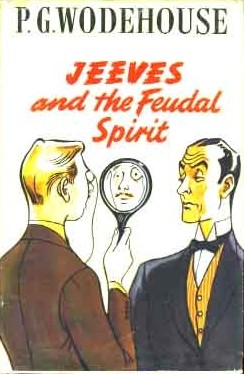
Jeeves and the Feudal Spirit is a comic novel by P. G. Wodehouse, first published in the United Kingdom on 15 October 1954 by Herbert Jenkins, London and in the United States on 23 February 1955 by Simon & Schuster, Inc., New York, under the title Bertie Wooster Sees It Through. It is the seventh novel featuring Bertie Wooster and his valet Jeeves.

"First Aid for Dora" is a short story by P. G. Wodehouse, which first appeared in the United States in the July 1923 issue of Cosmopolitan and in the United Kingdom in the August 1923 Strand. It features the irrepressible Stanley Featherstonehaugh Ukridge, and was included in the collection Ukridge, published in 1924.
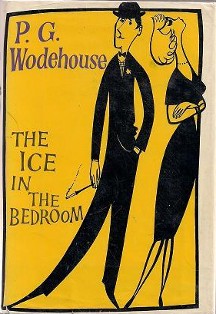
Ice in the Bedroom is a novel by P. G. Wodehouse, first published as a book in the United States on February 2, 1961 by Simon & Schuster, Inc., New York, and in the United Kingdom on October 15, 1961 by Herbert Jenkins, London.

"The Return of Battling Billson" is a short story by P. G. Wodehouse, which first appeared in the United States in the August 1923 issue of Cosmopolitan and in the United Kingdom in the September 1923 Strand. It features the irrepressible Stanley Featherstonehaugh Ukridge, and was included in the collection Ukridge, published in 1924.

"Ukridge Sees Her Through" is a short story by P. G. Wodehouse, which first appeared in the United States in the September 1923 issue of Cosmopolitan and in the United Kingdom in the October 1923 Strand. It features the irrepressible Stanley Featherstonehaugh Ukridge, and was included in the collection Ukridge, published in 1924.

Company For Henry is a novel by P. G. Wodehouse, first published in the United States on 12 May 1967 by Simon & Schuster, Inc., New York, under the title The Purloined Paperweight, and in the United Kingdom on 26 October 1967 by Barrie & Jenkins, London.

"The Custody of the Pumpkin" is a short story by British comic writer P. G. Wodehouse. It first appeared in the United States in the 29 November 1924 issue of The Saturday Evening Post, and in the United Kingdom in the December 1924 issue of Strand Magazine. Part of the Blandings Castle canon, it features the absent-minded peer Lord Emsworth, and was included in the collection Blandings Castle and Elsewhere (1935), although the story takes place sometime between the events of Leave it to Psmith (1923) and Summer Lightning (1929).
"The Go-Getter" is a short story by P. G. Wodehouse, which first appeared in the United States in the March 1931 issue of Cosmopolitan, and in the United Kingdom in the August 1931 Strand. Part of the Blandings Castle canon, it features the absent-minded peer Lord Emsworth, and was included in the collection Blandings Castle and Elsewhere (1935), although the story takes place sometime between the events of Leave it to Psmith (1923) and Summer Lightning (1929).
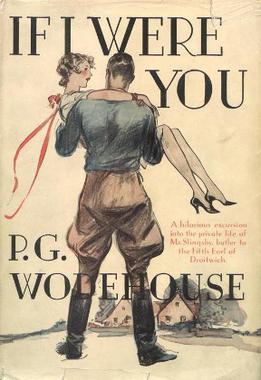
If I Were You is a novel by P. G. Wodehouse, first published in the United States on 3 September 1931 by Doubleday, Doran, New York, and in the United Kingdom on 25 September 1931 by Herbert Jenkins, London.
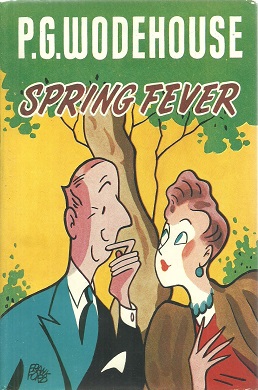
Spring Fever is a novel by P. G. Wodehouse, first published on 20 May 1948, in the United Kingdom by Herbert Jenkins, London, and on the same date in the United States by Doubleday and Co, New York. Although not featuring any of Wodehouse's regular characters, the cast contains a typical Wodehousian selection of English aristocrats, Stoker family relations, wealthy Americans, household staff and imposters.
"Birth of a Salesman" is a short story by P. G. Wodehouse, which first appeared in the United States in the 26 March 1950 issue of This Week magazine. Part of the Blandings Castle canon, it features the absent-minded peer Lord Emsworth, and was included in the collection Nothing Serious (1950).
"Best Seller" is a short story by the British comic writer P. G. Wodehouse. A part of the Mr. Mulliner series, the story was first published in the US in Cosmopolitan in June 1930, and in the UK in The Strand Magazine in July 1930. The Cosmopolitan version of the story does not include Mr Mulliner. The Mulliner version of the story was included in the collection Mulliner Nights (1933).
The Small Bachelor is a 1927 American comedy film directed by William A. Seiter and written by John B. Clymer, Rex Taylor and Walter Anthony. It is based on the 1927 novel The Small Bachelor by P. G. Wodehouse. The film stars Barbara Kent, George Beranger, and William Austin. The film was released on November 6, 1927, by Universal Pictures. Carl Laemmle was the film's presenter.
















